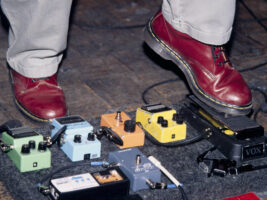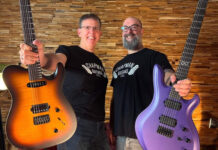
Cause & Effects: why do we love effects pedals more than guitars and amps?
I’ve been in and around the world of guitars, amps, and pedals for quite some time now, and over that time it’s become very apparent to me – both as a builder and as a fan – that the love affair with pedals has grown and grown to the point where in many cases it feels like it outstrips our love for new guitars and amps.
READ MORE: Cause & Effects: what turns a good overdrive pedal into a great one?
That’s not to say that new guitars and amps aren’t very popular, but they don’t seem to have the same ability to capture the zeitgeist of the online guitar community in the way that a really exciting new pedal does.
But why is this? For most of the last seven decades it has been guitars and amps that have dominated the cool conversation, what makes pedals different? And why is there so much love for them all of a sudden?
This got me thinking, what is it about the pedal world that makes it different to the guitar sector or the amp sector? Why is there so much love for pedals?
Pedalboard on stage during a soundcheck for Deaf Havana at the O2 Academy in Bristol. Image: Joby Sessions/Total Guitar Magazine/Future via Getty Images
The Obvious Answers
The most straightforward answer is that pedals are so varied and powerful these days that they offer a greater range of expression than most guitars and amps do on their own. Pedals give you the freedom to drastically alter and manipulate your guitar sound on the fly, and to move as the song does.
This freedom of expression has birthed entire genres of music – most notably shoegaze – and also enabled certain effects to become indeliably linked to certain guitarists. Imagine Hendrix without fuzz or a Univibe, imagine EVH without a Phase 90. How about David Gilmour without a delay, or Tom Morello without a Whammy.
The ability to set up pedals to create a wide variety of sounds, and indeed combine them in a near-infinite different combinations, is also attractive to many artists. Having your own unique set-up allows a customisation of sound that lets you stand out from the crowd – almost creating a musical fingerprint. Yes, plenty of legendary guitarists have managed to do this with just a guitar and amp, but pedals enable this uniqueness in the most simple and diverse manner.
Even when you have your sound crafted it’s not set in stone and often the addition of a choice pedal can inspire you as a musician to create new songs and go in a different direction. Even for someone who sees guitar as a hobby, it’s great to find a sound that you like, is individual and inspires you.
Boss TE-2 Tera Echo, Boss MO-2 Multi Overtone and a Boss DA-2 Adaptive Distortion effects pedal. Image: Adam Gasson/Guitarist Magazine/Future via Getty Images
The Less Obvious Answer
For me, and I would guess a lot of you too, pedals also offer an ability to engage with the guitar world in a less tribal fashion. Often guitarists will put themselves in certain camps – they’re Strat guys, Les Paul gals… they play Fender or Marshall or Mesa/Boogie and nothing else.
This brand/model loyalty can start off pretty early and it’s quite unusual to find a guitarist that doesn’t have a strong preference in this regard. Obviously, it’s great when you find the one guitar or amp that you really bond with, but there are downsides – it steers people away from trying new things, or causes them to disregard things they might otherwise enjoy on the basis of preconceptions and existing prejudice.
Pedals, for the most part, seem to be immune to this kind of narrow parochialism – they transcend genres and styles, and can be matched with any type of musician regardless of their intended use. It’s pretty common to see someone who only plays Fender, Gibson, Ibanez or what have you, but when was the last time you saw a pedalboard that was 100 per cent Strymon, or completely Walrus Audio outside of the confines of a trade show stand’s demo area?
Guitar pedals transcend the camps and cliques that the online guitar world often tries to force us into, and perhaps that’s why we love them.
Guitarist changing pedal effect. Image: Helder Faria/Getty Images
Creating A Community
If pedals are uniquely able to straddle genres, styles and backgrounds, it makes them ideally suited to help form something even more special: community. The ‘pedal community’ is often talked about in online circles but our collective enthusiasm for these little boxes of joy has clearly built something quite special.
It’s something I see all the time. We recently sent a pedalboard to Portland to an effects pedal showcase, where alongside other brands from all over the world, the attendees would get to try out a bunch of pedals they might never see in their local guitar shop and only see online otherwise.
Of course, online is where so much of the modern pedal community exists and thrives. All over social media, including forums, Facebook groups, YouTube you’ll see healthy debate, conversation, swap meets, etc all related to the “hobby” of guitar pedals.
Often I’ll see people asking for help with regards to their signal chain, pedalboard layouts, integration with amplifiers and guitars and in nine times out of ten the individual receives decades of collective experience free of charge. Even on my own group (which I’m the admin of) I’m often beaten to the chase in helping prospective ThorpyFx owners as others chime in and help them before I can get the chance. It’s brilliant to witness and is part of the reason why I love being part of this subculture within the electric guitar world.
Guitarist setting up a guitar multi-effect pedal. Image: Jim Lim/Getty Images
The Culture Of Online Video Demos
It’s perhaps no coincidence that the explosion of pedal culture has worked in tandem with the growth of YouTuber (I hate that term) and influencer (and that one) culture in the guitar world. You could see this from a purely capitalist perspective and decide that they’ve simply been great marketing tools to convince people to part with their cash in exchange for a relatively affordable product, but I think there’s more to it than that.
I mentioned at the top that part of the appeal of guitar pedals is how they offer a way to sound drastically different with the stamp of a footswitch – that also makes them uniquely suited to the modern guitar video environment.
A Bogner Uberschall, Ecstasy Blue and Ecstasy Red solid-state overdrive pedals. Image: Jesse Wild/Guitarist Magazine/Future via Getty Images
Because in truth, the differences between guitars and amps can be quite hard to quantify unless you’re in the room – and certainly not when listening to it on a phone or through earbuds. But a pedal? You can generally hear what that’s doing to your sound in any environment, and that makes them work so well as subjects for guitar videos.
What’s more, some of these online guitar personalities have transcended the role of someone helping you make a purchasing decision. People like Danish Pete, Chris Buck, Dan and Mick, Pete Thorn, Andy Martin and Josh Scott have become valued and important parts of the guitar community – imparting advice, driving trends and generally sharing the benefit of their sage wisdom. That’s not marketing – that’s adding value to the whole community.
A selection of guitar effects pedals. Image: Joseph Branston/Guitarist Magazine/Future via Getty Images
So Why DO We Love Pedals So Much?
Overall, the guitar pedal community and the culture surrounding it has morphed from being a gear-focussed one into a vibrant, colourful, and interconnected space. A space where everyone including musicians, hobbyists, creators, and builders can all interact free to explore their creativity and learn from others.
It’s a friendly and diverse community that centres around the awesome world of guitar effects. That’s why we love it, that’s why we love pedals, and long may it continue.
The post Cause & Effects: why do we love effects pedals more than guitars and amps? appeared first on Guitar.com | All Things Guitar.
Source: www.guitar-bass.net












